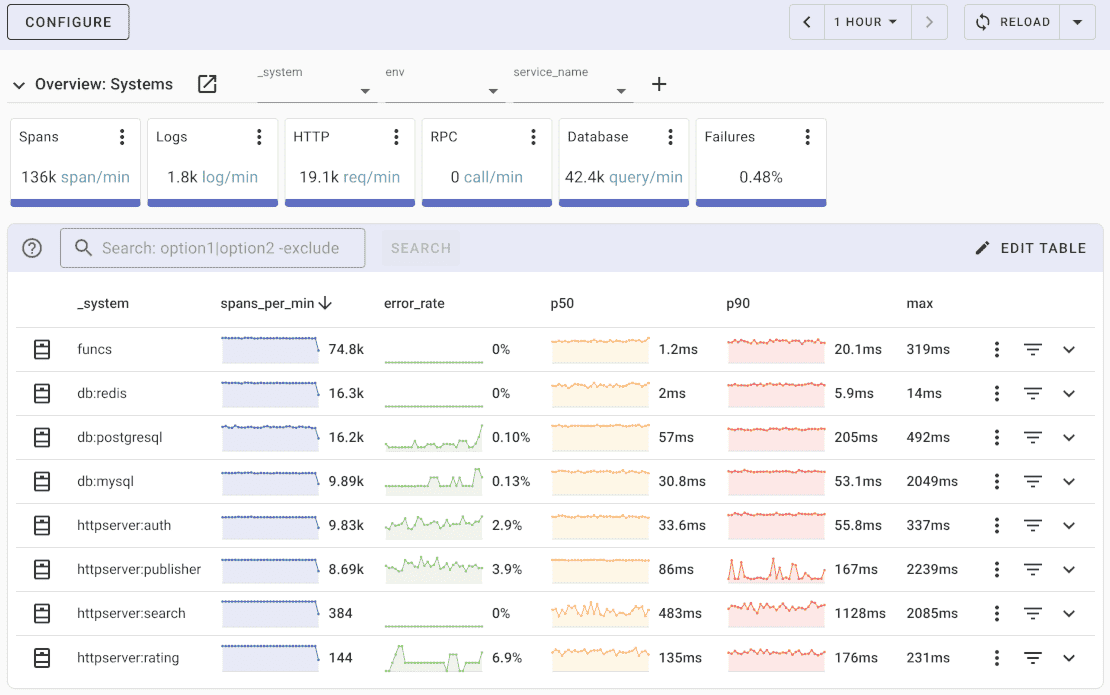OpenTelemetry PostgreSQL Monitoring
Monitoring PostgreSQL is essential to ensure the optimal performance, availability, and reliability of your PostgreSQL database.
This tutorial explains how you can use OpenTelemetry and Uptrace to monitor PostgreSQL performance, establish baseline metrics, and proactively address performance issues to ensure the optimal operation of your PostgreSQL database.
What is OpenTelemetry Collector?
OpenTelemetry Collector is an agent that pulls telemetry data from systems you want to monitor and export the collected data to an OpenTelemetry backend.
Otel Collector provides powerful data processing capabilities, allowing you to perform aggregation, filtering, sampling, and enrichment of telemetry data. You can transform and reshape the data to fit your specific monitoring and analysis requirements before sending it to the backend systems.
OpenTelemetry PostgreSQL receiver
Using OpenTelemetry Collector, you can monitor essential performance metrics provided by PostgreSQL, such as CPU usage, memory consumption, disk I/O, and network traffic.
To start monitoring PostgreSQL with Otel Collector, you need to configure PostgreSQL receiver in /etc/otel-contrib-collector/config.yaml using Uptrace DSN:
receivers:
otlp:
protocols:
grpc:
http:
postgresql:
endpoint: localhost:5432
transport: tcp
username: otel
password: $POSTGRESQL_PASSWORD
databases:
- otel
collection_interval: 10s
tls:
insecure: true
exporters:
otlp:
endpoint: api.uptrace.dev:4317
headers: { 'uptrace-dsn': '<FIXME>' }
processors:
resourcedetection:
detectors: [env, system]
cumulativetodelta:
batch:
timeout: 10s
service:
pipelines:
traces:
receivers: [otlp]
processors: [batch]
exporters: [otlp]
metrics:
receivers: [otlp, postgresql]
processors: [cumulativetodelta, batch, resourcedetection]
exporters: [otlp]
Don't forget to restart the service:
sudo systemctl restart otelcol-contrib
You can also check OpenTelemetry Collector logs for any errors:
sudo journalctl -u otelcol-contrib -f
OpenTelemetry Backend
Once the metrics are collected and exported, you can visualize them using a compatible backend system. For example, you can use Uptrace to create dashboards that display metrics from the OpenTelemetry Collector.
Uptrace is a OpenTelemetry APM that supports distributed tracing, metrics, and logs. You can use it to monitor applications and troubleshoot issues. Compare with top APM tools for PostgreSQL monitoring.

Uptrace comes with an intuitive query builder, rich dashboards, alerting rules with notifications, and integrations for most languages and frameworks.
Uptrace can process billions of spans and metrics on a single server and allows you to monitor your applications at 10x lower cost.
In just a few minutes, you can try Uptrace by visiting the cloud demo (no login required) or running it locally with Docker. The source code is available on GitHub.
Available metrics
Uptrace automatically creates the following dashboard when PostgreSQL metrics are available:

What's next?
PostgreSQL metrics are now flowing into your observability platform, providing database performance insights and query analysis. Compare with MySQL monitoring for different database engines, or explore Redis monitoring for caching layer observability.